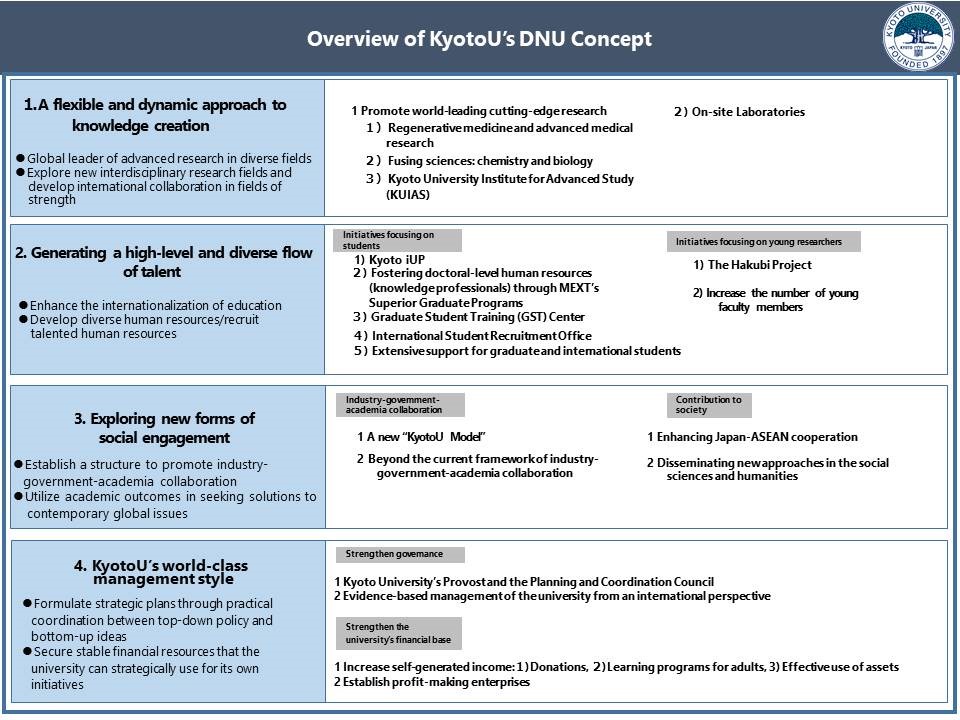Requirements for selection as a Designated National University (DNU)
Based on analyses of human and other resources, and including an assessment of evolving socio-economic circumstances, each DNU must establish a concrete strategy under the program, including time-frames and methods of implementation. Designated institutions are expected to spearhead the reform of Japan's national universities, sharing results, best practices, and outcomes with impact on the development of society and the economy.
Six DNU focal areas
Each DNU must focus its strategies and objectives on the following six areas:
- Recruitment and development of human capital
- Strengthening research capabilities
- Boosting international cooperation and collaboration
- Collaboration with society
- Strengthening governance
- Strengthening the university’s financial base
KyotoU's overall DNU concept
Kyoto University's DNU concept melds the foregoing six focal areas with its own unique traditions, seeking to establish innovative forms of university management, and enhancing the University's contributions to addressing grand challenges facing humanity.
- Promote world-leading research by establishing centers to advance the development of innovative research by top scholars in diverse fields.
- Establish locally-managed, "On-site Laboratories" in cooperation with overseas partner institutions to promote exchanges in education, industry-academia collaboration, and student, staff, and faculty development built on a foundation of robust research collaboration.
- Enhance international flows of knowledge and human capital in an environment of diversity and openness.
- Consolidate the University’s creative and cutting-edge achievements in order to drive innovation and boldly investigate contemporary global issues.
- Swiftly and comprehensively implement effective institutional governance while respecting the autonomy and diversity of the University’s departments and centers.
- Enhance university-led for-profit ventures to strengthen corporate governance, promote the utilization of research outcomes and intellectual property, and maximize returns to society.

Further details are provided in this PDF document .
A flexible and dynamic approach to knowledge creation
1. Promote world-leading, cutting-edge research
- Kyoto University Institute for Advanced Studies (KUIAS)
https://kuias.kyoto-u.ac.jp/e/ - Kyoto University Institute for the Advanced Study of Human Biology (ASHBi)
https://ashbi.kyoto-u.ac.jp/
2. On-site Laboratories
- On-site Laboratories
https://www.kyoto-u.ac.jp/en/about/operation/designated/on-site-laboratories
Generating a high-level and diverse flow of talent
Initiatives focusing on students
1. Kyoto University International Undergraduate Program (Kyoto iUP)
- Kyoto University International Undergraduate Program (Kyoto iUP)
https://www.iup.kyoto-u.ac.jp/
-
Fostering doctoral-level human resources (knowledge professionals) through MEXT's Superior Graduate Programs
- Innovation of Advanced Photonic and Electronic Devices
http://www.e-takuetsu.ceppings.kyoto-u.ac.jp/en/ - Center for Educational Program Promotion in Graduate School
http://www.ceppings.kyoto-u.ac.jp/en/
Initiatives focusing on young researchers
-
The Hakubi Project
- The Hakubi Project
https://www.hakubi.kyoto-u.ac.jp/eng
Exploring new forms of social engagement
Industry-government-academia collaboration
1. A new "KyotoU Model"
- Kyoto Academia Forum
http://www.kyoto-u.ac.jp/ja/kaf/ (in Japanese) - Office of Society Academia Collaboration for Innovation
https://www.saci.kyoto-u.ac.jp/en/ - Kyoto University Original Co, Ltd (multidisciplinary training and consulting services)
https://www.kyodai-original.co.jp/?page_id=576 - Kyoto University Innovation Capital Co, Ltd (support for venture businesses)
https://www.kyoto-unicap.co.jp/en/ - TLO-KYOTO Co, Ltd (technology transfer and licensing)
https://www.tlo-kyoto.co.jp/english/
Contributions to society
-
Disseminating new approaches in the social sciences and humanities
- Unit of Kyoto Initiatives for the Humanities and Social Sciences
http://ukihss.cpier.kyoto-u.ac.jp/ (in Japanese)

